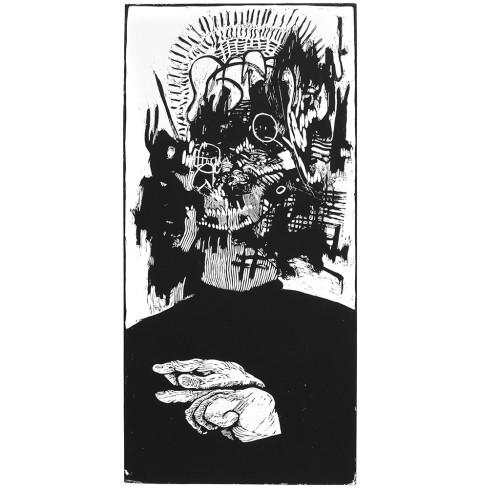Marjorie stands at the base of a mountain, too afraid to climb. The mountain has the face of a man. It’s her ex, an indifferent banker growing fat from poor people. No, it’s her absent father. Her boss. Marjorie has bad luck dating men. Inside her bedroom, she sits on the suitcase until it clasps shut, collapsed from weight or time or both. Outside, she swings open her car door, shifts into drive, reeking of antibacterial formula, hands still smelling of work. Marjorie takes the points. She wants to leave, drive anywhere. She spins directly into the side of the mountain, totals the front end of her car. The doctor tells her living was extremely fortunate. She mumbles yes, yes, pays her copay.
Every day, Marjorie will work for ten hours for minimum wage. She carpools with Rebecca, an incompetent trainee. Each day the day ends, and that’s it—she clocks out, feeds her sister’s cat across town, never dusts, underwear in piles around the room. Waits for another day to pass. Waiting, falls asleep. Then she sleeps and sleeps. Almost sleeps through her morning shift if it weren’t for Rebecca ringing her phone. Where is her phone? Marjorie hates her new immobile life. She can’t pay the mechanic. He threatens junking the vehicle for scrap money. The mountain creeps closer until it is pressed up against her window, fogging the glass. Marjorie swears it breathes. The mountain erupted inside the neighboring complex at first, killing her neighbors instantly, but she was too depressed to notice. She thinks the mountain is expressive. Scott, her landlord, tells her there was an earthquake when it formed, but she didn’t feel it—she slept through the event. He needs to inspect the property for damage or pets. Does she have rent. The next morning, the fire trucks block her in. Then and only then Marjorie sees the mountain for what it is, its hunched ridge looming spectacularly in her back yard. She doesn’t have a back yard, but means something by this expression. She can’t remember what.
The mountain hoped to make an entrance, some grand gesture. Instead it barely sprouted like a runt daisy. Here, the mountain strikes her as an inconvenience, not a natural wonder. The mountain begins to grow into Marjorie’s window, close enough so she can feel its heat. She wonders if it will bloom lava. The mountain pushes spider webs of cracks into the window glass, an unadorned Christmas reef. It is summer. Any day, tourists are stopped to take photos in front of the busted window, their voices carry in the shadow of the sudden landmark and keep Marjorie awake. People drink alongside the mountain and leave empty bottles all over the street. A festival is organized in honor of the mountain. The town votes on a name for the mountain no one uses. The mountain’s too slight to encourage much climbing, but down the street, an old man raises a placard above a rusty cart, proclaiming Magic Mountain Souvenirs open for business. He sells shirts and keychains, anthropomorphic hats. Legends are forged. Marjorie hears them circulating outside on the street. The mountain has been raised by dead gods. Of course. Marjorie can’t believe in magic, just coincidence. One night, fractured star light sprinkling into her room around her, she reaches out to touch the cheek of the mountain, but the mountain jumps aside, killing everyone it runs over, which isn’t as sad as the first time. Life goes on.



 The SmokeLong Grand Micro Contest (The Mikey) is now an annual competition celebrating and compensating the best micro fiction and nonfiction online.
The SmokeLong Grand Micro Contest (The Mikey) is now an annual competition celebrating and compensating the best micro fiction and nonfiction online.